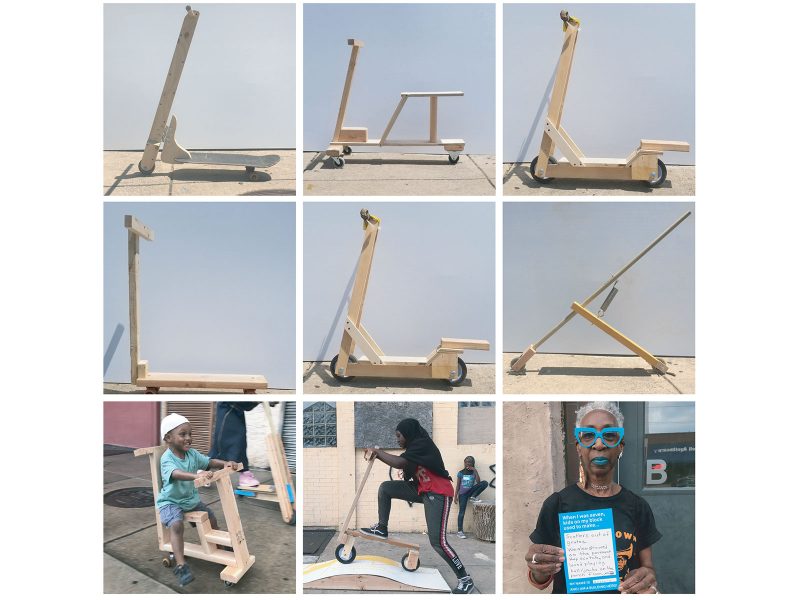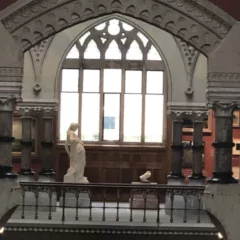
Putting the Jigsaw Together
by Laura Mays and Deirdre Visser
On a sweltering day in the summer of 2018, morning temperatures creeping above 100º, we met with Emily Bunker at Tiny WPA, a storefront on Lancaster Avenue, a bustling street in Philadelphia’s West Powelton neighborhood. Despite signs of public disinvestment, community members yell warm greetings back and forth across the street, and kids play in the sprinklers in front of the police department. It feels good to be here. Founded in 2012, Tiny WPA is a non-profit arts organizations named for Franklin D. Roosevelt’s Works Progress Administration. Operating from the belief that community members are the experts on the needs of their own neighborhoods, Tiny WPA works across generations to empower the community with skills to design and build improvements to their public spaces, schools, and micro-infrastructure.
Emily, a woodworker trained in high-end custom furniture shops, pieces together a creative livelihood, combining a job in framing at the Philadelphia Museum of Art, her role as an organizer and teacher at Tiny WPA, and a studio practice of her own. She talked with us about Tiny WPA, which she affectionately calls “Tiny,” and the Build Your Own Scooter project, part of the Build Your Own series.
Emily became involved with Tiny WPA while still building high-end custom furniture. Though she loved the diversity of those projects, the economic realities of custom work were ever-present:
At times it was hard to know that my work was going into someone’s second or third home. Although the projects were really interesting, I wanted to have a direct connection with the people I was making things for.
Nearly two years ago, Emily left custom work to spend more time at Tiny WPA, which continues to expand her understanding of the power of woodworking. If her output in high-end shops was meticulous and highly regulated, this kind of woodworking seeks a fundamentally different outcome: driven by the needs of the community, it becomes a tool for agency and change.
Even though there’s a focus on building, the focus is really on people. This work has opened my eyes to the fact that people are dealing with some tough stuff, especially in West Powelton. Finding ways to support and encourage people through the lens of building has been a huge learning experience for me.
Be fast, and don’t cut yourself!
In hands-on brainstorming sessions neighbors identify what they need, a bench for example, where it should go, what height it should be and for how many people. The results of thecommunity collaborative process are amazing.
Using power tools can feel literally empowering. Community members feel more comfortable and take more risks when the build is in their own neighborhood. After we construct prototypes together we take photos, refine and rework the idea and come up with a design that is based on the original concept.
Staff members like Emily return to the street with prepped parts in hand and find a community already invested in the fabrication and stewardship of the project.
They’re like, “That’s just what I wanted!” And the coolest part is seeing a 7 or 8 year old girl watch me and then pick up the drill and go for it. That’s so important to me, I love those moments. And there’s a lot of grandmothers that come around that space too. I think it shifts their attitude about what they can do.
The Scooter Project
Older members of the community often talk about making their own scooters in the 60’s and70’s, conjuring images of kids riding the streets of West Powelton on bedazzled vegetable crates mounted on the metal roller skate wheels of the time. Longtime resident Aminata described her brother stealing the wheels off of her skates to make his scooters. Fifty years on and still just a little upset by it, Aminata was excited to build her own, saying, “I can’t wait to send the photo to my brother, and it’ll be way cooler than his ever was!”
Conceived of and initiated by Tiny WPA co-founder Alex Gilliam, the Scooter Project aimed to connect the neighborhood and get folks of all ages building scooters together and sharing stories. It happened over three consecutive Wednesday afternoons in July 2018, with the help of skilled volunteers called Building Heroes. There was a 5-year-old, an 80-year-old, and everyone in between. In the shop downstairs, Heroes facilitated the creative chaos of making, while participants would routinely break to carry their prototype outside to race around on the sidewalk. Testing is an important part of the process. In the storefront upstairs, those who’d grown up in the 60s and 70s shared stories about their childhoods while younger participants listened, captivated.
Emily described one moment in particular, when a senior came in who uses a triangular walker:
Adele went into the basement with her walker and rolled over one of the ramps with it. It was quite versatile! The scooter her group ended up designing looked a little like that, which was interesting. Reconsidering that walker as something playful was kind of amazing. I’m sure it impacted the way she thought about it.
Exploring context, nurturing relationships, and fostering the empowerment that comes with building, Tiny WPA is part of a nationwide discussion about creative place-making and collaborative design. Build Your Own Scooter was an exercise in digging into local community history and allow that history to inspire and playfully inform the present.
In the field of community-led design and education, making sure that participants have the opportunity to learn from someone that looks like them matters, but the economics and culture of non-profit arts organizations doesn’t always support this value. Tiny WPA’s Building Hero Training program prioritizes participants from the neighborhood, and seeks to support Heroes’ ongoing leadership in West Powelton after the program.
West Powelton is a changing neighborhood; on the edge of University City, the pressures of gentrification are present daily. And for Emily Bunker it feels that much more precious and important to listen and record these stories right now.
San Francisco native Deirdre Visser is a career educator, artist, and curator with a focus on cultural pluralism and community-based arts. Laura Mays is the Program Director and Instructor at The Krenov School of Fine Woodworking at Mendocino College in Fort Bragg CA. Both are woodworkers, and they are working on a book about women in woodworking, in collaboration with Phoebe Kuo, due out in 2020. They are interviewing women in their woodshops all over the USA, including Emily Bunker at Tiny WPA. A show of women in woodworking at the Center for Art in Wood in Philadelphia is planned for Fall 2019.
www.deirdrevisser.net
www.lauramays.com
www.womenwoodworking.org
Centerforartinwood.org









